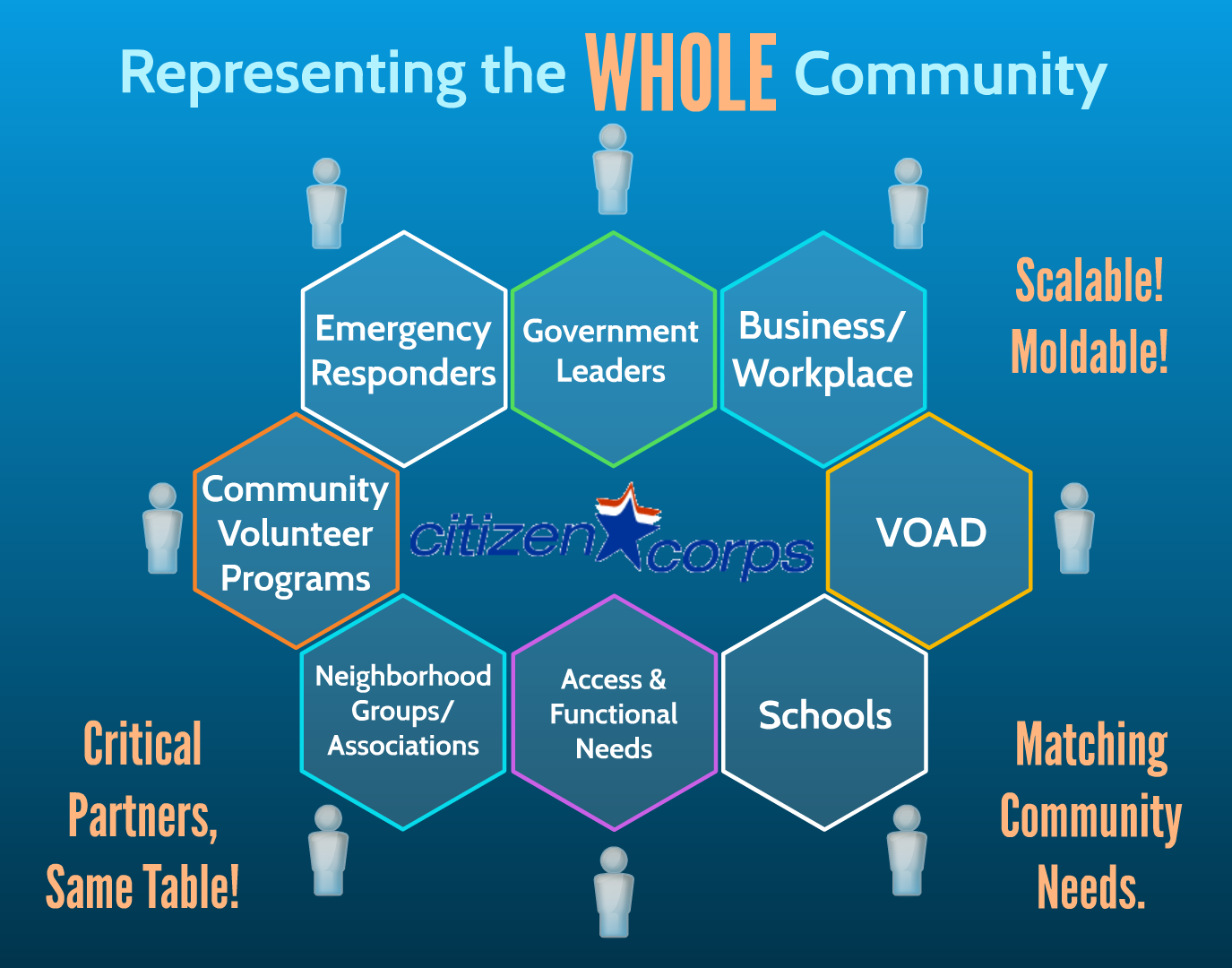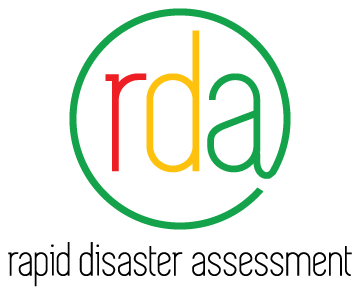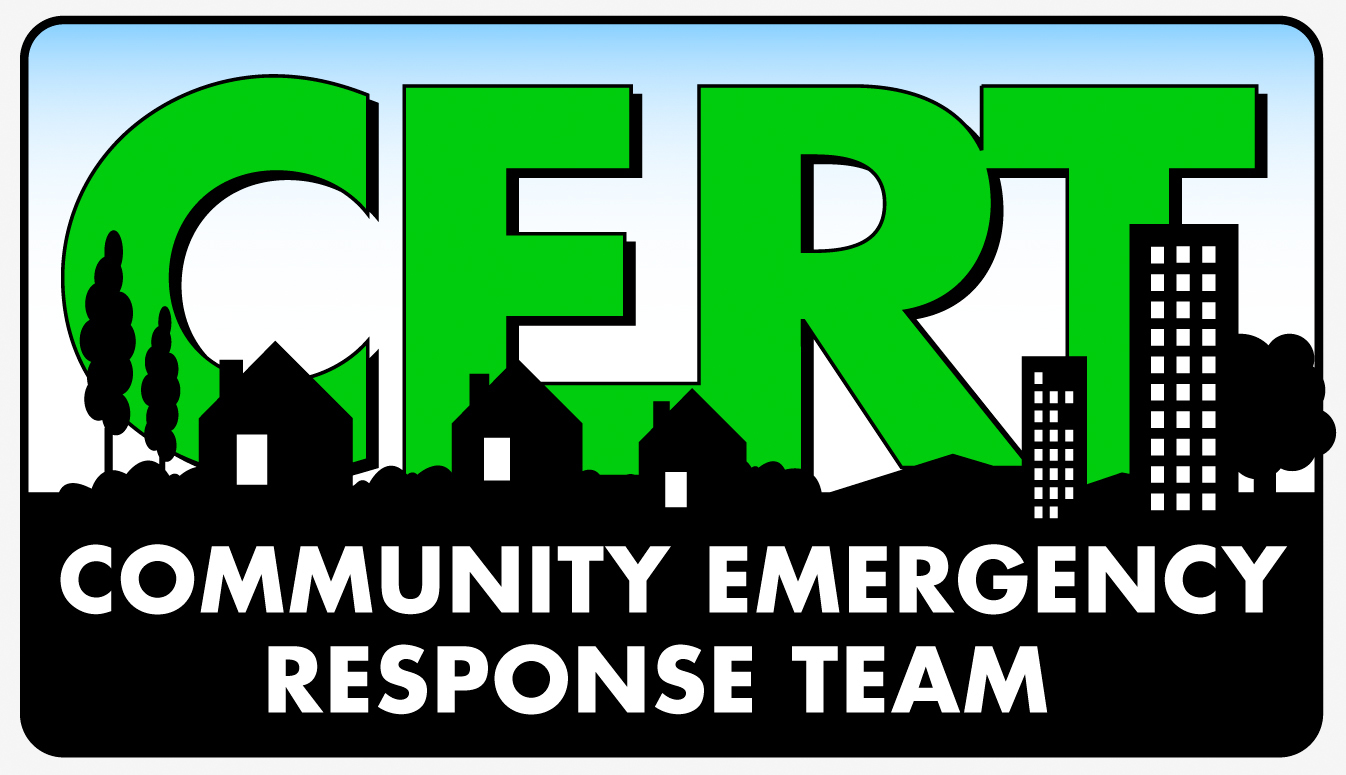Whole Community Preparedness Coalitions
THE POINT
Community preparedness involves all organizations within the community. A framework to organize this effort is provided to help your community make a Whole Community Preparedness Coalition. Local coalitions come in all shapes and sizes and go by different names. Find the leaders of the various community partners, invite them to the table, and discover ways to work together to prepare your community.
DO THIS
- Get involved by joining an existing Whole Community Preparedness Coalition
OR
- Work with your local elected leaders to build a Whole Community Preparedness Coalition in your community.
- Register your Coalition with the State of Utah Citizen Corps Coordinator.
VIDEOS
DOWNLOADS
- Comprehensive Preparedness Guide (CPG) 101: Developing and Maintaining Emergency Operations Plans
- A Whole Community Approach to Emergency Management: Principles, Themes, and Pathways for Action
- Engaging Faith-Based and Community Organizations: Planning Considerations for Emergency Managers.
- Local Elected and Appointed Officials Quick Reference Guide
- Local Elected and Appointed Officials Emergency Management Checklist
- Citizen Corps Guide for Local Officials
- Whole Community Coalitions Program Quick Sheet
- Community Wildfire Preparedness Plan
- The Public Officials Guide to Disasters
- Resources the State Citizen Corps Coordinator Provides
Find a Coalition
Contact your Local municipality to find out if they have one, or contact Be Ready Utah and ask for a list of Coalitions near you.
Register a Coalition
Register your local Whole Community Preparedness Coalition by emailing Be Ready Utah and requesting your coalition be registered.
"Whole Community" is a means by which residents, emergency management practitioners, organizational and community leaders, and government officials can collectively understand and assess the needs of their respective communities and determine the best ways to organize and strengthen their assets, capacities, and interests. A "Whole Community Coalition" involves key partners from each of the community sectors in order to reach and involve every person within the community in mitigation, preparedness, response, and recovery efforts, where key partners may include emergency response organizations, government officials, businesses, nonprofit organizations, faith-based and community groups, volunteer organizations, schools, media, and access and functional needs groups.
A Whole Community Coalition is the vehicle that enables key partners to collaborate, cooperate, communicate, and coordinate efforts.
Whole Community Preparedness Coalitions (WCPC) are synonymous in purpose and function as COAD and Citizen Corps. This concept involves all the partners from all the various community sectors and provides a forum where they can work together.

WCPC Vision: Communities that are safer, stronger, and better prepared to respond to all hazards.
WCPC Purpose: To provide a whole community forum where partners can meet and work together, breaking down siloes and building partnerships so when disaster strikes we can all work together.
WCPC Mission: To engage the whole community in emergency planning and preparedness, and to empower every individual through education, training, and volunteer service opportunities. WCPC promotes a self-sustaining culture of emergency preparedness for all individuals and communities; and unites the emergency management community to coordinate efforts necessary to mitigate, prepare for, respond to, and recover from emergencies, disasters, and catastrophic events.
WCPC Activities: Identifying partner needs and capabilities, sharing emergency plans, coordinating events and projects, and sharing information with partner constituents.
General WCPC Program Policy
A WCPC Program can exist at a City or County or State level.
- Be approved by and registered with the State of Utah, keep registry up to date.
- Be approved by the local government and sponsored by a local government organization (Emergency Management, Fire, Police, Public Works, or Elected Official).
- Designate a program point of contact. (The program manager who runs the day to day affairs of the coalition)
- Designate a program sponsor point of contact. (The one ultimately responsible for the program and designates who the program manager is)
Tools and Resources
The following tools and resources will help to learn about, start, sustain, and improve Whole Community Preparedness Coalitions (WCPC).
WCPC Prezi
This Prezi describes all the parts of a Whole Community Preparedness Coalition and how it works.
WCPC Prezi
WCPC Toolkit
This toolkit contains ideas, templates, resources, etc. to help WCPC's fulfill their purpose and mission.
WCPC Toolkit
Disasterville
Disasterville is a whole community disaster table top activity, and is great tool for:
- Recruitment and Conversation Starting
- Sponsor By-In
- Training and Exercise
- Preparedness Education
Disasterville Toolkit
Neighborhood Rapid Disaster Assessment Toolkit
This is an alternative solution to the Block Captain Program. This allows anyone to fill a role and perform the task of assessing your community post disaster.
Neighborhood Rapid Disaster Assessment Toolkit
Whole Community Partners
The following are a few partner programs that may have an interest in joining a local WCPC.
Voluntary Organizations Active In Disaster (VOAD)
Utah VOAD
Private Sector Preparedness Council
A Private Sector Preparedness Council (PSPC) helps connect the community's private sector to emergency preparedness principles and practices.
Private Sector Preparedness Councils
Neighborhood Watch
Neighborhood Watch Training empowers community members to be the eyes and ears for law enforcement. The Neighborhood Watch Toolkit may provide valuable information to help you in your efforts. Also see the National Neighborhood Watch page
Neighborhood Watch Toolkit
Community Emergency Response Team
CERT training empowers your community to organize and safely respond to disasters. See the CERT Website to learn more about CERT.
Community Emergency Response Team (CERT)
Community Animal Response Team (CART)
CART empowers community planning and response for animal related issues. CART is supported by the Utah Department of Agriculture and Food which provides tools for local implementation.
Community Animal Response Team (CART)
COMMUNITY PARTNERS
- Community Emergency Response Teams (CERT)
- Community Animal Response Teams (CART)
- Medical Reserve Corps (MRC)
- Fire Corps
- Volunteers In Police Service (VIPS)
- Neighborhood Watch
- Voluntary Organizations Active in Disasters (VOAD)
- Utah Commission on Service and Volunteerism (UServeUtah)
- American Red Cross Utah
- Disaster Discovery Center
- FEMA at Ready.gov
- Utah Division of Emergency Management
- Utah Special Needs Registry
- Utah 211
- USU Extension Services (Preparedness)
- Dominion Energy Emergency & Safety Information
- Rocky Mountain Power
- Rocky Mountain Center for Occupational and Environmental Health
- Intermountain Center for Disaster Preparedness




